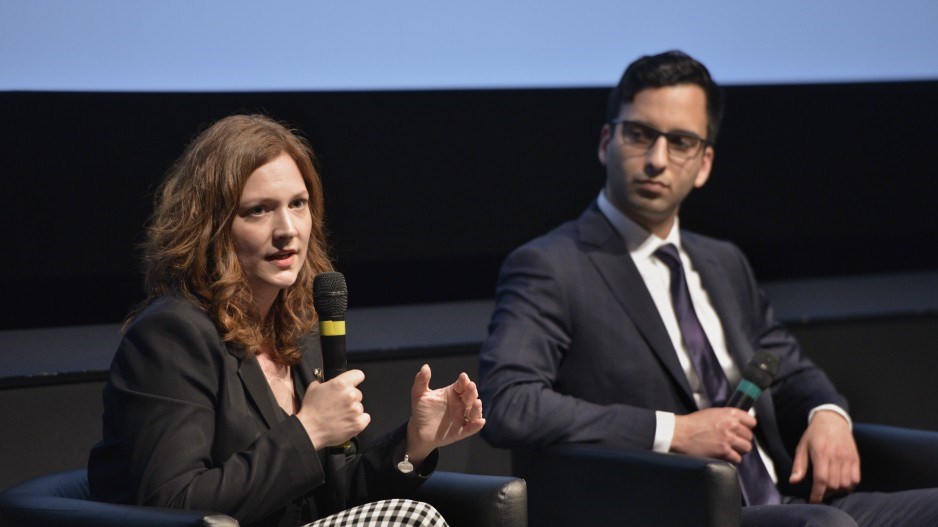The revolution will be distributed via ledger.
Panellists at Business in Vancouver’s most recent Business Excellence Series event The Blockchain Revolution, held at the Vancity Theatre April 26, tackled the growing phenomenon that is upending various industries.
“The way I like to think of it is as like Google Docs, it’s a distributed ledger,” said Gary Boddington, co-founder and CEO of Sports Technology Group, takign took the first crack at explaining the technology behind blockchain.
Boddington, who has worked in various roles within the technology industry, explained, “It’s a distributed spreadsheet, it’s a distributed database that’s never existed before in the sense that the blockchain has brought on this ability to share information on a distributed ledger. And previously, we couldn’t all work on the same database, and now effectively that database is distributed, so at a very fundamental level those are the foundational elements about it.”
The entire cryptocurrency market was valued at more than US$600 billion at the end of 2017, according to CoinMarketCap. Cryptocurrencies are digital assets that use blockchain for their transactions. Bitcoin, the most famous, recently had its 17 millionth coin mined, and after a tumultuous ride in valuation earlier in the year, it appears to have stabilized.
However, there are various ways in which blockchain technology can be used outside of cryptocurrencies. Panellist Kelly Samuels, a partner with EKB who focuses on financial services, said at the heart of what makes blockchain so appealing to various industries is a new form of information sharing.
“There are a couple of issues that I think blockchain can be very helpful with,” she said. “First is centralization of authority and the location of data and this idea that blockchain permits disintermediation. So you don’t have to have necessarily a central authority for a transaction to go through if you can execute the transaction using blockchain, then verification of that transaction is going to be done on a distributed basis by a consensus algorithm, and essentially everyone will agree that that transaction is valid.”
Samuels said in a way, this could decentralize a host of forms for doing business, from election ballots to legal contracts.
“You don’t need one centralized authority to say, ‘Yes, that transaction, that securities trade or that real estate transaction, I’m the land title office, I say it’s valid, I’m the settlement system on your securities system that says that’s happened.’ The blockchain would permit that to be done on a distributed basis.”
Like many countries, Canada is trying to play catch-up in the regulation of blockchain technologies. Panellist Reza Dehghani, who works for Mackie Research and is an early adopter of cryptocurrencies and blockchain technologies, said Canada is third in the world when it comes industry startups.
“It’s pretty interesting that we were the third runner-up because [Canada] is one of the strictest,” he said, adding that it’s “a shame” that blockchain-based organizations are relocating overseas, “because countries like Switzerland and Singapore are much friendlier, and governments allow regulations for these companies to actually operate.”
Dehghani said Canada’s legislative framework for data storage is at odds with the fundamentals behind blockchain technology and its distributed ledger system, but strides are being made within the public sector toward adopting the technology.
In January, the federal government launched a trial program to explore the use of blockchain technology in making government research grants and funding information more transparent to the public. The National Research Council is using the Catena Blockchain Suite, a Canadian-made product built on the Ethereum blockchain, to publish funding and grant information in real time for the trial. Dehghani said more effort needs to be made so blockchain’s technology can fit within our country’s regulatory frameworks.
“As you know, when it comes to Canadian jurisdiction – at least when it comes to businesses – any personal information must be held in Canada in regards to clients’ data,” he said. “So let’s say you’re an insurance company, or you’re a hospital, you must have that information on a server stored within Canada and let’s say you don’t have that and it’s stored elsewhere, you will be fully liable for any type of security breach that happens. Compared to if you had your data hosted locally here, the onus would actually be on the data company.”




